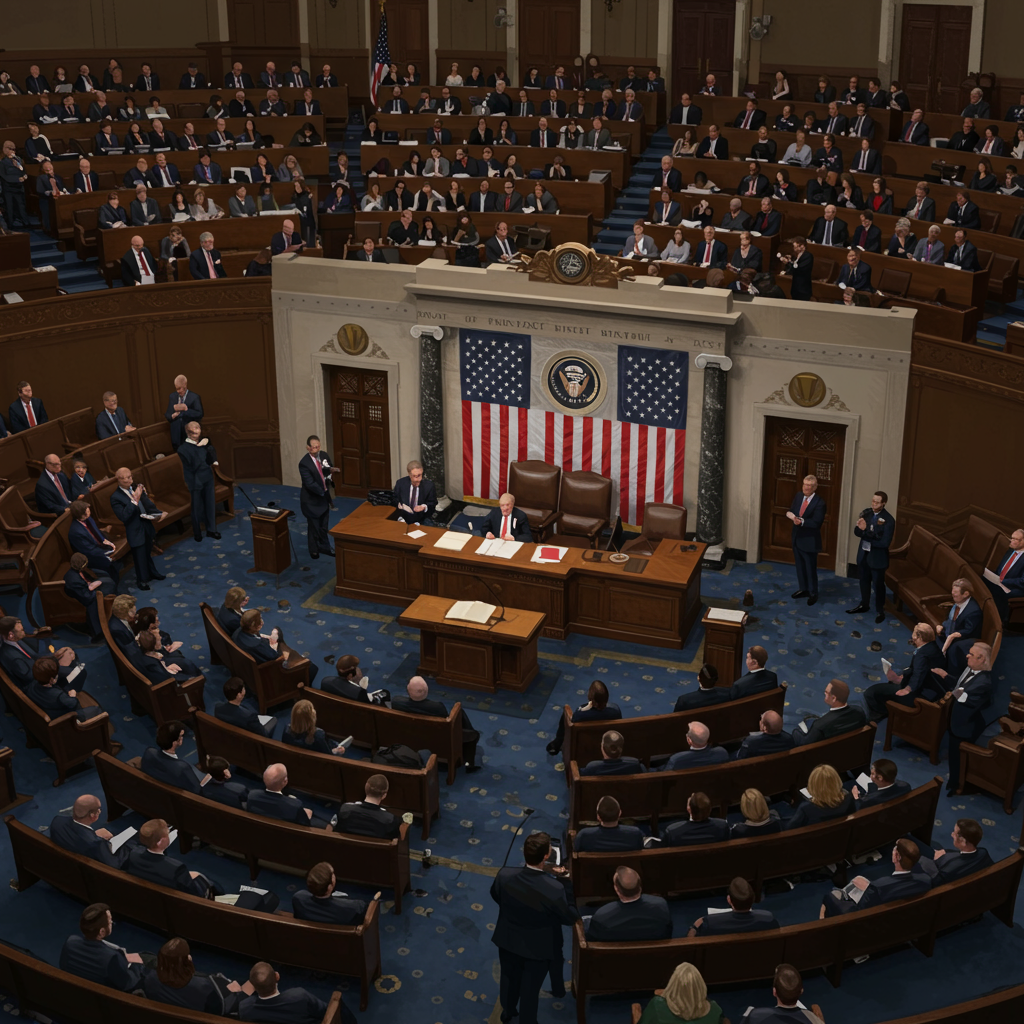In a significant development on Capitol Hill, the U.S. Senate recently voted against a resolution aimed at restricting President Donald Trump’s authority to order military action against Iran without explicit approval from congress. This vote, occurring on a Friday in late June 2025, represents a key moment in the ongoing debate over the balance of war powers between the executive and legislative branches of the American government. The measure failed largely along party lines, underscoring deep divisions within Washington regarding foreign policy and constitutional authority in times of international tension.
Senate Blocks Effort to Curb Presidential War Powers Over Iran
The resolution, formally titled “to direct the removal of United States Armed Forces from hostilities against the Islamic Republic of Iran,” was spearheaded by Democratic Senator Tim Kaine of Virginia. Its core purpose was to compel the President to seek authorization from Congress before engaging in any further offensive military actions against Iran. Supporters argued this was a necessary step to reassert Congress’s constitutional role in deciding whether the nation goes to war, particularly in the wake of recent U.S. military strikes.
The vote count stood at 53 against the resolution and 47 in favor. While the outcome largely reflected partisan divisions, there were notable exceptions. Senator Rand Paul, a Republican from Kentucky, crossed the aisle to vote in favor of the measure. Conversely, Senator John Fetterman, a Democrat from Pennsylvania, voted against it.
Constitutional Authority and Historical Context
Senator Kaine forcefully articulated the resolution’s basis on the Senate floor. He emphasized that the power to declare war resides solely with Congress, according to the U.S. Constitution. Kaine highlighted the intentions of the nation’s founders in 1787, who were deliberately hesitant to vest the immense power of initiating war in a single individual, even the first Commander-in-Chief, George Washington.
“They decided that war was too big a decision for one person,” Kaine stated. He argued that the Constitution was specifically drafted to ensure the United States would not enter into armed conflict without a vote by the people’s representatives in Congress. This perspective directly challenges the increasing tendency of presidents from both parties to use military force abroad without explicit congressional authorization, often relying on existing statutes or their authority as Commander-in-Chief.
The debate surrounding this resolution is rooted in the 1973 War Powers Resolution. This act was intended to require the president to consult with Congress before introducing U.S. forces into hostilities and to remove them within 60-90 days if Congress does not authorize the action. Proponents of Kaine’s resolution saw it as upholding the spirit and intent of this foundational law, specifically applied to the context of potential conflict with Iran. They argued that any significant military action against Iran beyond immediate self-defense necessitates a full debate and vote in Congress.
Recent Tensions Set the Stage
The push for this resolution came amidst heightened tensions and recent military exchanges between the U.S. and Iran. Days before the Senate vote, on June 22nd, President Trump had ordered airstrikes on three Iranian nuclear facilities: Fordo, Natanz, and Isfahan. These strikes reportedly followed earlier attacks launched by Israel against Iran, which were met with Iranian retaliation.
President Trump claimed the U.S. bombardment “totally obliterated” key nuclear enrichment facilities and declared the mission a success. However, some initial reports suggested the damage might have been minimal. Iran, for its part, strongly condemned the U.S. attacks. The administration notified Congress of the strikes via letter, as required by the War Powers Resolution, describing them as “limited in scope and purpose” and aimed at deterrence and de-escalation.
Following the strikes and leading up to the Senate vote, President Trump made further statements regarding Iran’s nuclear program. He asserted on Friday that Iran had halted its nuclear ambitions after the bombings. Despite this claim, he also indicated a willingness to order additional strikes if he believed Iran resumed enriching uranium. “I would absolutely continue to attack the country’s nuclear sites if I believed it was once again enriching uranium,” Trump stated at the White House. He added, “Time will tell… But I don’t believe that they’re going to go back into nuclear anytime soon.”
Partisan Arguments and Broader Legislative Efforts
Republican opponents of Kaine’s resolution largely defended the President’s actions and argued against restricting his authority. Senator Bill Hagerty of Tennessee contended that Iran posed an imminent threat requiring decisive presidential action. He argued that Congress should not “shackle” the Commander-in-Chief during a crisis, supporting Trump’s decision to act without prior congressional approval. They viewed the recent strikes as a legitimate exercise of executive power, not the precursor to a prolonged conflict.
Democrats, alongside some Republicans, questioned the administration’s justification of an “imminent threat.” They criticized the lack of timely and adequate briefings to Congress, noting that the first comprehensive briefings occurred days after the strikes. Senator Kaine emphasized that his resolution was not intended to impede actions taken in immediate self-defense but to ensure careful consideration and political consensus for offensive military initiatives. He expressed disappointment that many colleagues seemed unwilling to support Congress’s critical role in such profound decisions.
Some lawmakers remained skeptical even after classified briefings. Representative Jim Himes, the top Democrat on the House Intelligence Committee, reportedly saw nothing to suggest the threat from Iran was significantly more imminent just before the strikes than it had been previously.
The vote on Kaine’s resolution was just one part of a broader legislative push across both chambers of Congress seeking to reassert war powers. In the House, Republican Rep. Thomas Massie of Kentucky and Democratic Rep. Ro Khanna of California introduced a measure under the War Powers Resolution specifically aimed at blocking U.S. strikes on Iran unless Congress provides explicit approval. “This is not our war,” Massie asserted, emphasizing Congress’s constitutional mandate. This resolution was described as “privileged,” potentially forcing a House vote.
In the Senate, beyond Kaine’s effort, Independent Senator Bernie Sanders of Vermont pursued a separate measure. His proposal sought to prohibit the use of federal funds or military force against Iran without explicit congressional consent, with the exception of self-defense.
These varied legislative efforts highlight the deep-seated, often bipartisan, tension regarding the balance of power in foreign policy and military intervention. While many lawmakers acknowledge Congress’s constitutional role, the specific context of potential conflict, the perceived nature of the threat, and partisan loyalty often dictate the outcome of votes like the one on Kaine’s resolution.
Iran’s Response and Future Uncertainty
Adding another layer to the situation, Iran’s foreign minister, Abbas Araghchi, responded to President Trump’s statements shortly after the Senate vote. Using language described as mimicking Trump’s social media style, Araghchi posted on X. He rebuked Trump’s tone as “disrespectful and unacceptable” towards Iran’s Supreme Leader, Grand Ayatollah Khamenei.
Araghchi stated that “The Great and Powerful Iranian People… do not take kindly to Threats and Insults.” He also made pointed reference to recent events involving Israel, claiming the Israeli regime had “NO CHOICE but to RUN to ‘Daddy’ to avoid being flattened by our Missiles.” Araghchi concluded with a warning: “If Illusions lead to worse mistakes, Iran will not hesitate to unveil its Real Capabilities, which will certainly END any Delusion about the Power of Iran.”
This exchange underscores the volatile nature of U.S.-Iran relations. While President Trump mentioned a reported ceasefire between Israel and Iran and the possibility of future nuclear talks with Iran, the Senate’s decision to uphold the President’s perceived authority regarding military action leaves the door open for potential future strikes without mandatory congressional approval.
The vote on Kaine’s resolution reflects a recurring struggle in American history over who holds the ultimate authority to commit the nation to war. Despite constitutional mandates and legislative attempts like the War Powers Resolution, the executive branch has often asserted expansive powers in this domain. The Senate’s decision, while framed by some opponents as supporting the President’s necessary flexibility in a dangerous world, is seen by proponents as a failure to uphold Congress’s fundamental duty to deliberate and decide on matters of war and peace.
The outcome means President Trump retains significant discretion regarding further military action against Iran. The debate over war powers, however, is far from settled and will likely continue to shape the relationship between Congress and the presidency on matters of foreign policy and defense. Future events involving Iran will undoubtedly reignite this fundamental constitutional question.
Frequently Asked Questions
Why did some lawmakers argue Congress should approve military action against Iran?
Lawmakers supporting resolutions like the one introduced by Senator Tim Kaine argue that the U.S. Constitution explicitly grants the power to declare war solely to Congress. They believe this power was deliberately placed with the legislative branch by the nation’s founders to prevent a single person, the President, from unilaterally deciding to commit the country to war. They see requiring congressional approval for offensive military actions as essential to upholding this constitutional principle and ensuring robust debate and political consensus before engaging in hostilities abroad.
Which specific legislative measures were attempted to limit presidential war powers regarding Iran?
Beyond the Senate resolution sponsored by Senator Tim Kaine which failed, other legislative efforts were underway. In the House of Representatives, Republican Rep. Thomas Massie and Democratic Rep. Ro Khanna introduced a resolution under the War Powers Resolution framework to block U.S. strikes on Iran without explicit congressional approval. Additionally, Independent Senator Bernie Sanders proposed a measure in the Senate that aimed to prohibit the use of federal funds or military force against Iran without congressional consent, except for self-defense. These show a broader, multi-faceted effort by lawmakers to reassert legislative authority.
What was the immediate context or trigger for this Senate resolution vote?
The resolution vote followed closely after a period of escalating tensions and specific military actions between the U.S. and Iran. Just days prior, President Trump had ordered airstrikes on three Iranian nuclear facilities after reported attacks by Israel on Iran and subsequent Iranian retaliation. Trump’s statements indicating he would consider further strikes if Iran resumed enriching uranium provided the immediate backdrop. Senator Kaine’s resolution was introduced as a direct response, seeking to mandate congressional authorization for any follow-up military action beyond the recent strikes.
Word Count Check: 1206 words



